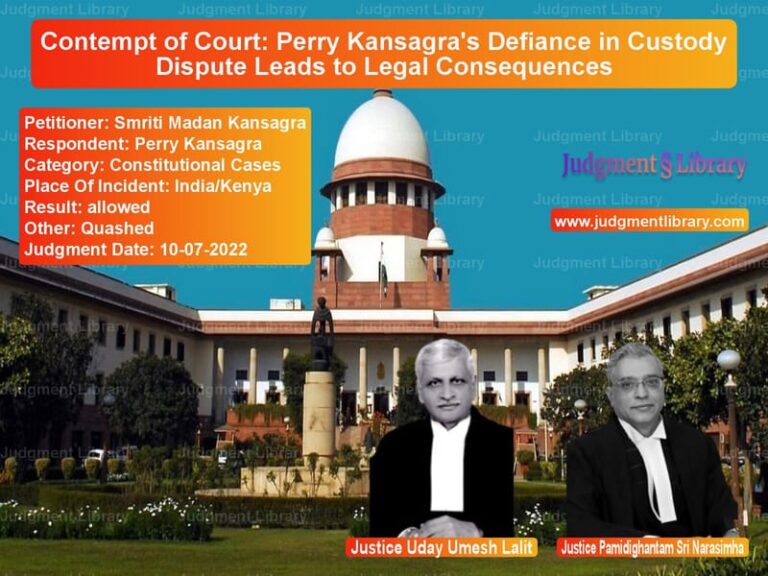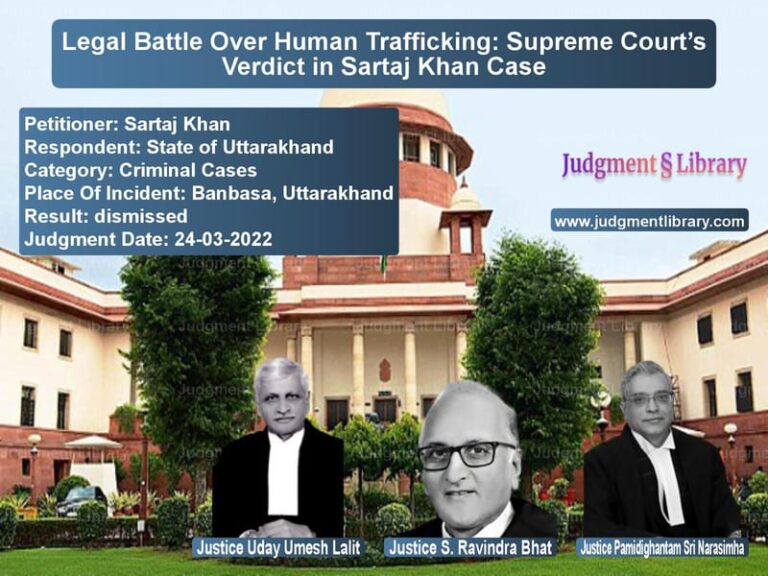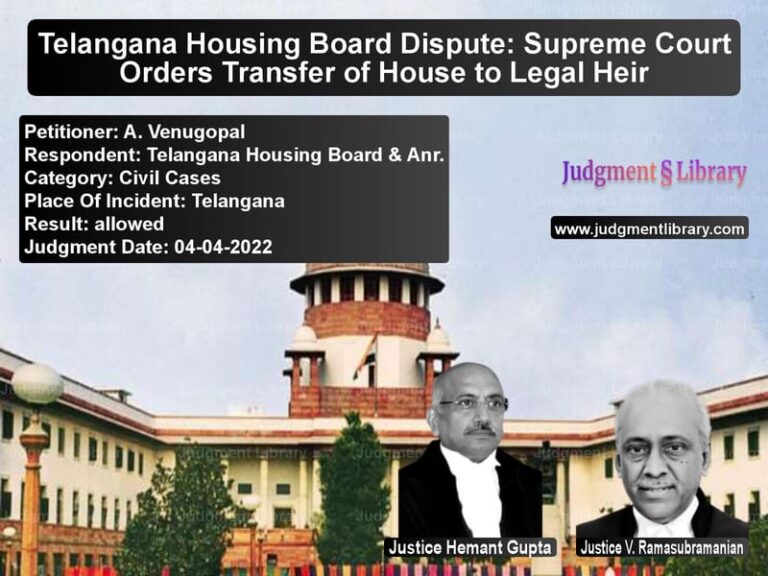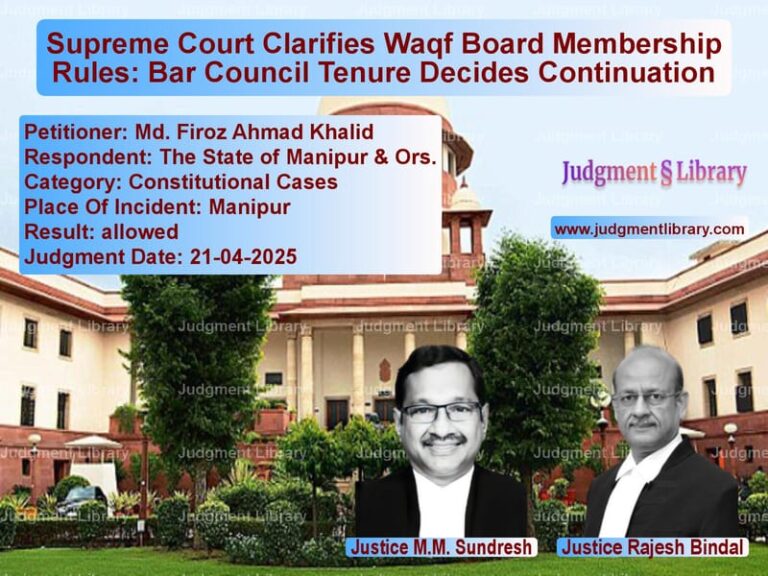Pension Rights for University Professors: Supreme Court Upholds Advocate Experience for Pension Benefits
The Supreme Court recently delivered a significant judgment in the case of Dr. G. Sadasivan Nair vs. Cochin University of Science and Technology, addressing the applicability of past legal practice experience for pension benefits. The Court ruled in favor of the appellant, holding that his years of practice as an advocate should be counted towards his pension eligibility, similar to other faculty members who had received such benefits. This decision underscores the importance of equality in service conditions and prevents selective denial of legitimate pension claims.
Background of the Case
Dr. G. Sadasivan Nair was appointed as a Lecturer in the School of Legal Studies at Cochin University of Science and Technology (CUSAT) on September 7, 1984. Before his appointment, he had practiced law at the District and Subordinate Courts in Kerala from March 11, 1972, to February 2, 1980. He later pursued a Ph.D. and resumed legal practice in the Kerala High Court until his university appointment.
After serving at the university for more than two decades, he retired on April 30, 2007. Prior to his retirement, in 2004, he made a representation to the university seeking to count his past legal practice towards his pension eligibility under Rule 25(a) of the Kerala Service Rules (KSR), Part III. The rule allowed those recruited after the age of 25 to add their professional experience at the Bar to their qualifying pensionable service.
However, the university rejected his request, stating that an amendment to the rule in 1985 restricted its application to posts requiring both a law degree and Bar experience. The university claimed that a teaching position did not require prior legal practice, making Dr. Nair ineligible for the benefit.
Petitioner’s Arguments
Dr. Nair challenged the university’s decision on several grounds:
- At the time of his appointment in 1984, Rule 25(a) did not include the restrictive proviso. Therefore, it should apply to him without limitation.
- The proviso introduced in 1985 should not apply retrospectively to deny him pension benefits.
- Other university professors, including Dr. P. Leela Krishnan, had received pension benefits by including their legal practice tenure.
- The denial of benefits was arbitrary and discriminatory, violating Article 14 of the Indian Constitution (Right to Equality).
- Since he joined the university after legal practice, his case fit within the intended scope of Rule 25(a).
Respondent’s Arguments
The Cochin University and the Kerala government defended their decision, stating:
- Rule 25(a), as amended in 1985, applied to Dr. Nair because pension eligibility is determined based on rules in force at retirement, not at the time of appointment.
- The proviso restricted benefits to those recruited to posts explicitly requiring Bar experience, which did not include teaching positions.
- The university had the right under Article 309 of the Constitution to modify service conditions, including pension rules.
- Dr. Nair had submitted his request for pension inclusion in 2004, two decades after his appointment, making it time-barred.
- Even if Dr. P. Leela Krishnan received pension benefits, that could not justify extending benefits to Dr. Nair based on a flawed precedent.
Supreme Court’s Observations
The Supreme Court examined both sides’ arguments and made several critical observations:
1. Pension Rules Must Be Applied Uniformly
The Court noted that another professor, Dr. P. Leela Krishnan, had received pension benefits based on his past legal practice:
“If the respondent university sought to deny the benefit of Rule 25(a) due to the 1985 proviso, it ought to have done so uniformly. Selective application of rules is arbitrary and legally untenable.”
2. Proviso Should Not Be Applied Retrospectively
The Court ruled that since Dr. Nair was appointed before the 1985 amendment, the restrictive proviso could not be applied to him:
“The benefit of Rule 25(a) was available at the time of appointment. A later amendment should not retrospectively deprive an employee of already vested rights.”
3. Rule 25(a) Was Misinterpreted
The Court clarified that Rule 25(a) never restricted teaching positions from receiving benefits, even after the 1985 amendment:
“The university’s reasoning that legal practice was not a prerequisite for a teaching post is misplaced. The rule never barred law faculty from pension benefits.”
4. Right to Pension is a Vested Right
Referring to past rulings, the Court reiterated that pension rights are a part of an employee’s service conditions and cannot be denied arbitrarily:
“The right to receive pension crystallizes at retirement. Any discriminatory denial violates Article 14.”
Supreme Court’s Verdict
Based on these findings, the Supreme Court:
- Allowed Dr. Nair’s appeal and set aside the High Court’s judgment.
- Directed Cochin University to recalculate his pension, including his years of legal practice.
- Ordered the university to pay arrears from 2007 onward with 5% interest per annum.
- Instructed compliance within two months of the judgment.
Implications of the Judgment
The ruling has broad implications for pension rights and administrative fairness:
- Prevents Selective Denial: Universities cannot arbitrarily deny benefits to some employees while granting them to others.
- Retrospective Rule Changes Cannot Take Away Vested Rights: Employees cannot be deprived of benefits due to later amendments.
- Pension Rules Must Be Applied Consistently: Similar employees must receive equal treatment under pension laws.
- Strengthens Pension Rights for Law Faculty: Legal scholars and university teachers can claim prior legal experience for pension benefits.
The judgment reinforces equality in service conditions and upholds the principle that pension rights, once vested, cannot be unfairly revoked.
Petitioner Name: Dr. G. Sadasivan Nair.Respondent Name: Cochin University of Science and Technology & Ors..Judgment By: Justice M.R. Shah, Justice B.V. Nagarathna.Place Of Incident: Kochi, Kerala.Judgment Date: 01-12-2021.
Don’t miss out on the full details! Download the complete judgment in PDF format below and gain valuable insights instantly!
Download Judgment: dr.-g.-sadasivan-nai-vs-cochin-university-of-supreme-court-of-india-judgment-dated-01-12-2021.pdf
Directly Download Judgment: Directly download this Judgment
See all petitions in Pension and Gratuity
See all petitions in Employment Disputes
See all petitions in Public Sector Employees
See all petitions in Judgment by Mukeshkumar Rasikbhai Shah
See all petitions in Judgment by B.V. Nagarathna
See all petitions in allowed
See all petitions in Modified
See all petitions in supreme court of India judgments December 2021
See all petitions in 2021 judgments
See all posts in Service Matters Category
See all allowed petitions in Service Matters Category
See all Dismissed petitions in Service Matters Category
See all partially allowed petitions in Service Matters Category







